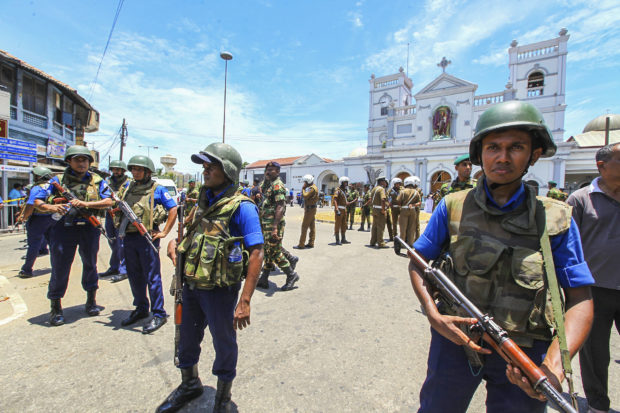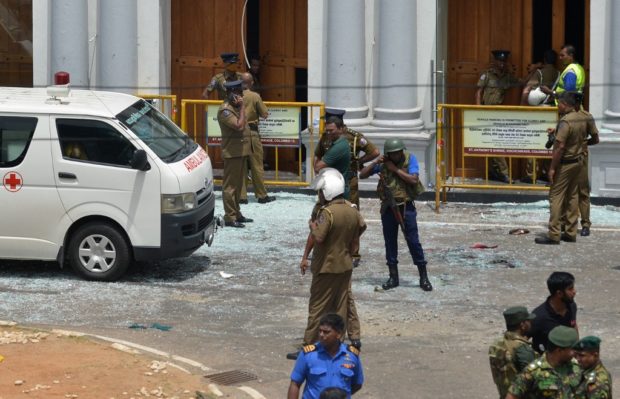Possible intel failures to be examined in Sri Lanka blasts
COLOMBO, Sri Lanka – Police in Sri Lanka said Monday the investigation into the Easter Sunday bombings will examine reports that the intelligence community failed to detect or warn of possible suicide attacks before the violence.
The nine bombings of churches, luxury hotels and other sites was Sri Lanka’s deadliest violence since a devastating civil war in the South Asian island nation ended a decade ago.

Sri Lankan Army soldiers secure the area around St. Anthony Shrine after a blast in Colombo, Sri Lanka, Sunday, April 21, 2019. More than hundred were killed and hundreds more hospitalized with injuries from eight blasts that rocked churches and hotels in and just outside of Sri Lanka’s capital on Easter Sunday, officials said, the worst violence to hit the South Asian country since its civil war ended a decade ago. (AP Photo/Chamila Karunarathne)
Police spokesman Ruwan Gunasekara said Monday the death toll, which was 207 late Sunday, had risen overnight but the figure wasn’t immediately released.
Two government ministers have alluded to intelligence failures.
Telecommunications Minister Harin Fernando tweeted, “Some intelligence officers were aware of this incidence. Therefore there was a delay in action. Serious action needs to be taken as to why this warning was ignored.”
He said his father had heard of the possibility of an attack as well and had warned him not to enter popular churches.
Article continues after this advertisementAnd Mano Ganeshan, the minister for national integration, said the security officers within his ministry had been warned by their division about the possibility two suicide bombers would target politicians.
Article continues after this advertisementPolice spokesman Ruwan Gunasekara said the Criminal Investigation Department investigating the blasts will look into the reports.
Defense Minister Ruwan Wijewardena previously described the blasts as a terrorist attack by religious extremists, and police said 13 suspects were arrested, though there was no immediate claim of responsibility.
Wijewardena said most of the bombings were believed to have been suicide attacks.
The explosions — mostly in or around Colombo, the capital — collapsed ceilings and blew out windows, killing worshippers and hotel guests in one scene after another of smoke, soot, blood, broken glass, screams and wailing alarms. Victims were carried out of blood-spattered pews.
“People were being dragged out,” said Bhanuka Harischandra, of Colombo, a 24-year-old founder of a tech marketing company who was going to the Shangri-La Hotel for a meeting when it was bombed. “People didn’t know what was going on. It was panic mode.”
He added: “There was blood everywhere.”
Most of those killed were Sri Lankans.
But the three bombed hotels and one of the churches, St. Anthony’s Shrine, are frequented by foreign tourists, and Sri Lanka’s Foreign Ministry said the bodies of at least 27 foreigners from a variety of countries were recovered.
The Sri Lankan government lifted a curfew that had been imposed during the night.
But most social media remained blocked Monday after officials said they needed to curtail the spread of false information and ease tension in the country of about 21 million people.
Prime Minister Ranil Wickremesinghe said he feared the massacre could trigger instability in Sri Lanka, and he vowed to “vest all necessary powers with the defense forces” to take action against those responsible.
The Archbishop of Colombo, Cardinal Malcolm Ranjith, called on Sri Lanka’s government to “mercilessly” punish those responsible “because only animals can behave like that.”
The scale of the bloodshed recalled the worst days of Sri Lanka’s 26-year civil war, in which the Tamil Tigers, a rebel group from the ethnic Tamil minority, sought independence from the Buddhist-majority country. The Tamils are Hindu, Muslim and Christian.
Sri Lanka, off the southern tip of India, is about 70 percent Buddhist.

Sri Lankan security personnel stand next to an ambulance outside St. Anthony’s Shrine in Kochchikade in Colombo on April 21, 2019 following a blast at the church. (Photo by ISHARA S. KODIKARA / AFP)
Scattered incidents of anti-Christian harassment have occurred in recent years, but nothing on the scale of what happened Sunday.
Two Muslim groups in Sri Lanka condemned the church attacks, as did countries around the world, and Pope Francis expressed condolences at the end of his traditional Easter Sunday blessing in Rome.
“I want to express my loving closeness to the Christian community, targeted while they were gathered in prayer, and all the victims of such cruel violence,” Francis said.
Six nearly simultaneous blasts took place in the morning at the shrine and the Cinnamon Grand, Shangri-La and Kingsbury hotels in Colombo, as well as at two churches outside Colombo, according to a Sri Lankan military spokesman, Brig. Sumith Atapattu.
A few hours later, two more blasts occurred just outside Colombo, one of them at a guesthouse, where two people were killed, the other near an overpass, Atapattu said.
Also, three police officers were killed during a search at a suspected safe house on the outskirts of Colombo when its occupants apparently detonated explosives to prevent arrest, authorities said.
The Shangri-La’s second-floor restaurant was gutted, with the ceiling and windows blown out. Loose wires hung down and tables were overturned in the blackened space. From outside the police cordon, three bodies could be seen covered in white sheets. /gsg